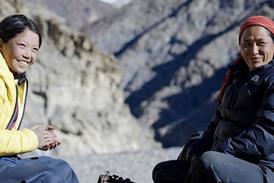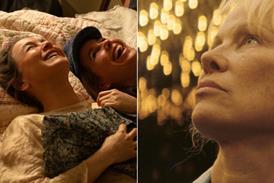Dir: Neil Labute. US. 2000. 110 mins.
Prod cos: Ab-Strakt Pictures, Propaganda, IMF. Domestic dist: USA Films. Int'l sales: Summit Entertainment (+1 310 309 8400). Exec prods: Philip Steuer, Stephen Pevner, Moritz Borman, Chris Sievernich. Prods: Gail Mutrux, Steve Golin. Scr: John C Richards, James Flamberg. Dop: Jean Yves Escoffier. Prod des: Charles Breen. Ed: Joel Plotch, Steven Weisberg. Music: Rolfe Kent. Main cast: Renee Zellweger, Morgan Freeman, Chris Rock, Aaron Eckhart, Greg Kinnear, Tia Texada, Pruitt Taylor Vince.
Labute's third film, the first not directed from his own screenplay, offers an apparently more benign view of the human condition than his two corrosive previous outings, The Company Of Men and Your Friends And Neighbors. And, unlike those movies, it offers one central figure which audiences can empathise with in the form of Nurse Betty, a naive diner waitress who leaves Kansas for Hollywood to follow her dream.
The extent to which this ploy succeeds depends on whether one buys into the sweet warmth of Zellweger's performance or is left irritated by a woman whose obsession often borders on simple-mindedness or mythomania. Sitting uneasily in the official competition line-up, it's certainly Labute's most commercially promising film to date, though the peppiness is also punctured with moments of emotional and physical cruelty (there's a bloody scalping in an early scene) which offer some brusque ruptures of tone and may prove a turn-off in certain quarters.
Betty (Zellweger) is trapped in an unfulfilling marriage to arch-jerk Del (Eckhart), from which she finds solace in an addiction to daytime soap opera, in particular a hospital melodrama called A Reason To Love starring the perennially lovelorn heart surgeon Dr David Ravell (Kinnear). Her life abruptly changes after she witnesses Del's murder at the hands of two drugs traffickers whom he has been attempting to double-cross.
The experience pitches her into something called a "dissociative fugue state": a piece of peculiarly American psychobabble which apparently refers to the way a person deals with trauma by inventing a new identity. She takes off to Los Angeles in pursuit of "Doctor David" who, she is now persuaded, is her ex-fiance, with the local sheriff and reporter as well as the two lowlifes in pursuit.
Here she undergoes a series of increasingly bizarre adventures, landing a nursing job and saving a life, despite the fact that her only medical expertise is culled from television, and eventually buttonholing the soap star, to his vast embarrassment, at a swish cocktail party. At first taking her infatuation as the clever tactic of a Method Actress looking for a job, the actor is eventually won over by Betty's ingenuous enthusiasm and offers her a role in the show.
Meanwhile the elder of the two hit men (the ever-excellent Freeman), a gentleman-hood whose courtly ideas are at odds with his profession, also falls for her. The complications escalate as - like her fellow countrywoman from The Wizard Of Oz - Betty becomes drawn into this strange and wonderful world, and carves her own destiny within it.
Labute handles the farcical proceedings adequately but without particular distinction; as in his own scripts, the strongest moments are those intimate confrontations in which comedy and tragedy, irony and genuine emotion, and the balance of power all hover on a cruel knife edge. His French DoP Escoffier gives the film a fluid, fast-moving elegance which helps paste over some of the cracks in logic and makes the piece look quite unlike Labute's more static and stylised earlier work.



















No comments yet